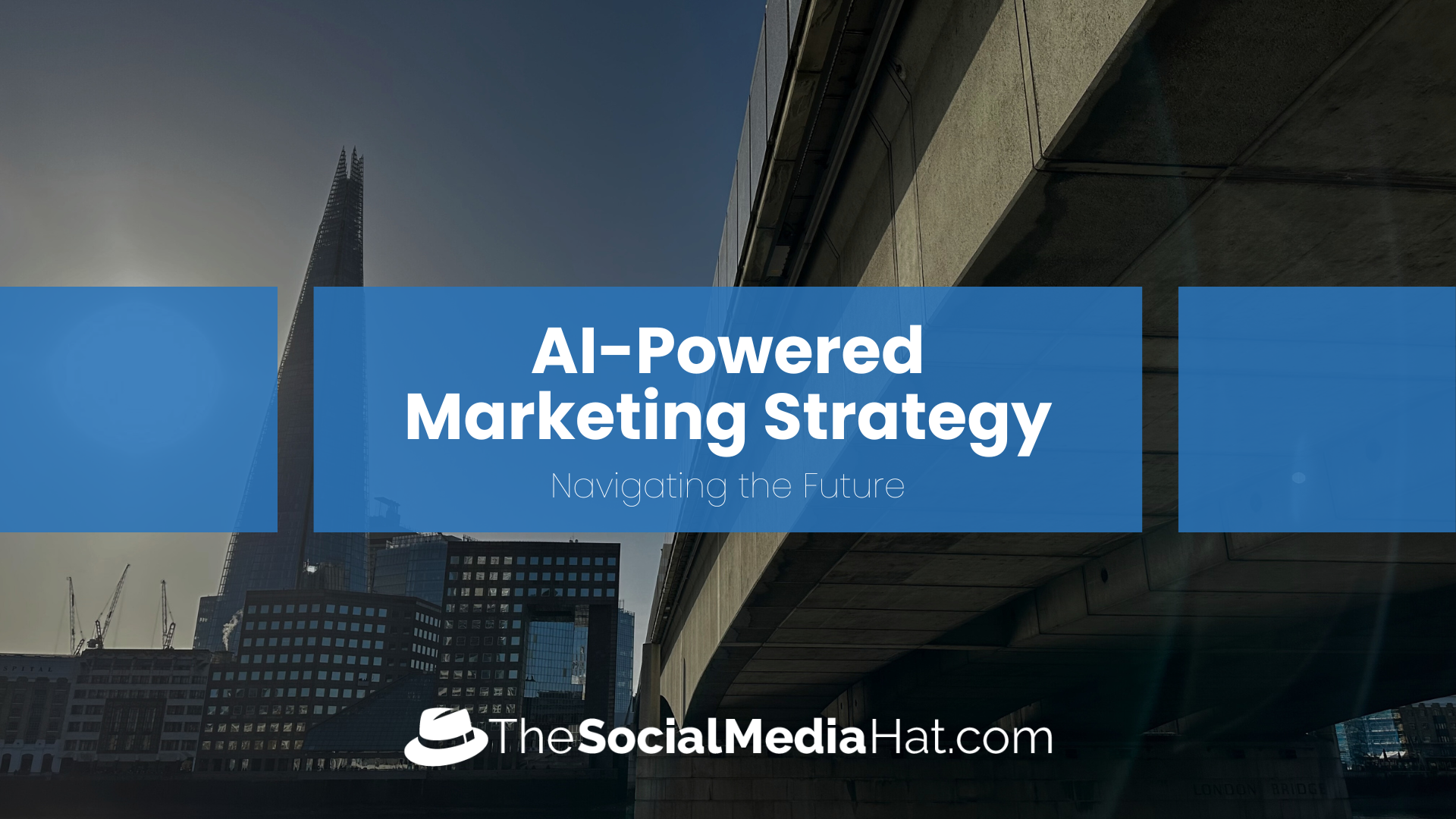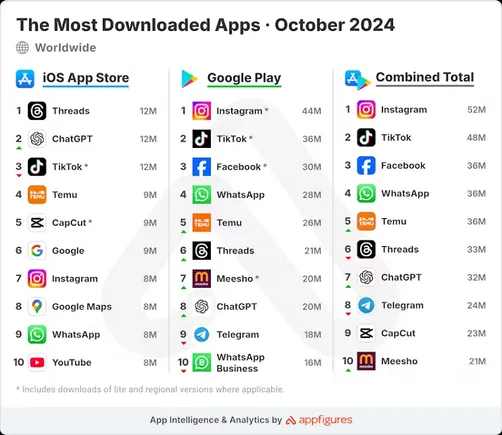For small and medium-sized business (SMB) owners, navigating the complexities of modern marketing poses a significant challenge. The need to stay competitive, reach target audiences effectively, and allocate resources wisely requires a strategic approach. In this article, I’m going to delve into the profound impact of artificial intelligence (AI) on marketing strategy, offering SMBs insights into the evolving landscape and actionable steps to harness the power of AI in 2024.
The Current Landscape: AI Trends in Marketing Strategy
“Facebook, Twitter, reddit, the Internet itself, the iPhone, and on and on and on—most people dismissed these things as incremental or trivial when they first came out.”
In the fast-paced realm of marketing, AI is not merely a futuristic concept but a dynamic force reshaping marketing strategy. As we step into 2024, several key trends highlight the transformative impact of AI on marketing practices. These trends go beyond buzzwords, representing tangible shifts that businesses, especially SMBs, should be attuned to:
Predictive Analytics Redefining Decision-Making
Predictive analytics, fueled by AI, has become a linchpin for strategic decision-making. By analyzing vast datasets, businesses can anticipate market trends, customer behaviors, and potential opportunities. This trend empowers SMBs to make informed choices, minimizing risks and maximizing the effectiveness of their marketing strategy.
Example: Consider a local retailer leveraging predictive analytics to forecast consumer demand. By understanding buying patterns and preferences, the retailer strategically adjusts inventory and promotional efforts, leading to increased sales and customer satisfaction.
Personalized Content Recommendations Elevating Engagement
AI-driven personalization has evolved beyond basic customization. Advanced algorithms now analyze user behavior, preferences, and historical interactions to deliver hyper-personalized content. This trend not only enhances user engagement but also fosters a deeper connection between brands and their audiences.
Example: An e-commerce platform utilizing AI-powered recommendations observes individual user preferences and browsing history. By tailoring product suggestions based on this data, the platform enhances the user experience, driving higher conversion rates and customer loyalty.
Chatbots Revolutionizing Customer Interactions
Chatbots, powered by natural language processing (NLP), have become indispensable in customer service. These AI-driven entities provide instant responses, answer queries, and even guide users through complex processes. For SMBs, integrating chatbots enhances efficiency and ensures round-the-clock availability.
Example: A local service provider implementing a chatbot on its website streamlines customer inquiries. The chatbot efficiently addresses common questions, schedules appointments, and provides valuable information, enhancing overall customer satisfaction.
Voice Search Optimization Gaining Prominence
With the rise of voice-activated devices, optimizing for voice search has emerged as a crucial aspect of AI-driven marketing strategy. SMBs recognizing the significance of voice search optimization ensure their content aligns with the conversational queries users make through voice-activated assistants.
Example: A neighborhood restaurant optimizing its online presence for voice search ensures that potential customers using voice commands like “find a nearby restaurant” or “order food near me” discover its offerings effortlessly.
As we explore these trends, it becomes evident that AI is not a distant prospect but a present reality shaping marketing strategy. The examples provided showcase how SMBs, by embracing these trends, can gain a competitive edge in the dynamic marketing landscape of 2024.
Challenges and Opportunities: Navigating the AI Terrain
The integration of AI into marketing strategy brings forth a spectrum of challenges and opportunities. For SMBs, navigating this dynamic terrain requires a nuanced understanding of both the obstacles to overcome and the avenues to explore:
Challenges
Resource Constraints
SMBs often face limitations in terms of budget and manpower. Implementing AI-powered solutions may seem daunting due to perceived high costs and the need for specialized expertise. Overcoming resource constraints demands a strategic approach to prioritize AI applications that align with business goals.
Opportunity: Leverage AI tools that offer scalable solutions within budget constraints. Cloud-based AI services, for instance, provide accessibility without the need for extensive infrastructure.
Data Privacy and Security Concerns
The collection and utilization of customer data for AI-driven insights raise privacy and security considerations. Ensuring compliance with data protection regulations becomes paramount, and SMBs must establish robust measures to safeguard sensitive information.
Opportunity: Implement transparent data policies and adopt AI solutions with built-in privacy features. Emphasize ethical data practices to build trust with customers.
Skill Gap and Training Needs
Acquiring AI-specific skills within the existing workforce may pose a challenge. SMBs might encounter difficulties in recruiting talent proficient in AI technologies, leading to a potential gap in the utilization of advanced tools.
Opportunity: Invest in training programs to upskill existing employees. Collaborate with educational institutions or seek partnerships with AI experts to bridge the skill gap gradually.
Opportunities
Enhanced Customer Understanding
AI enables SMBs to delve deeper into customer behaviors, preferences, and expectations. By leveraging AI-driven analytics, businesses gain insights that go beyond conventional data, fostering a comprehensive understanding of their target audience.
Challenge: Ensuring ethical data usage and obtaining customer consent for data processing are critical considerations.
Agile Decision-Making Processes
The real-time analytics provided by AI facilitates agile decision-making. SMBs can adapt swiftly to changing market dynamics, respond to emerging trends, and optimize their marketing strategy based on data-driven insights.
Challenge: Balancing the need for speed with the requirement for thorough analysis to avoid impulsive decisions.
Competitive Edge in Personalization
AI-driven personalization allows SMBs to tailor their offerings to individual customer needs. This level of customization enhances the customer experience and provides a competitive edge in a market saturated with generic content.
Challenge: Striking the right balance between personalization and privacy concerns, ensuring customers feel valued without intruding on their privacy.
Automation for Efficiency
Automation through AI streamlines repetitive tasks, freeing up human resources to focus on strategic initiatives. This efficiency gain is particularly beneficial for SMBs looking to maximize output with limited resources.
Challenge: Identifying tasks suitable for automation and maintaining a balance to preserve the human touch where needed.
In navigating the AI terrain, SMBs must approach challenges as opportunities for growth. By addressing resource constraints strategically, prioritizing data privacy, investing in employee training, and seizing the advantages AI presents, businesses can carve a path to sustainable success in the AI-driven marketing landscape.
Key AI Technologies Transforming Marketing Strategy
The integration of AI technologies into marketing strategy opens up a realm of possibilities for SMBs aiming to elevate their approach. Let’s delve into the key AI technologies reshaping the marketing landscape and explore how businesses can leverage them strategically:
Machine Learning (ML)
At the forefront of AI, machine learning empowers marketers with predictive analytics, automation, and personalized recommendations. SMBs can harness ML algorithms to analyze customer behavior, predict trends, and automate decision-making processes.
Example: Implementing ML algorithms to analyze past customer interactions and predict future preferences, enabling personalized product recommendations.
Natural Language Processing
NLP enables machines to understand, interpret, and respond to human language. This technology finds applications in chatbots, sentiment analysis, and content optimization, enhancing customer engagement and communication.
Example: Deploying chatbots with NLP capabilities to interact with customers in real-time, providing instant support and information.
Computer Vision
Computer vision allows machines to interpret visual information, opening avenues for visual search, image recognition, and augmented reality. SMBs can leverage computer vision to enhance product discovery and create immersive brand experiences.
Example: Implementing visual search capabilities on an e-commerce platform, enabling users to find products by uploading images.
Predictive Analytics
Predictive analytics utilizes historical data and AI algorithms to forecast future trends and outcomes. SMBs can use predictive analytics to optimize marketing campaigns, identify potential leads, and allocate resources effectively.
Example: Predicting customer churn based on historical data, allowing proactive retention strategies.
Voice Search Optimization
With the rise of voice-activated devices, optimizing for voice search becomes crucial. SMBs can adapt their content and SEO strategies to align with the conversational nature of voice queries.
Example: Adapting website content to address natural language queries for voice-activated search.
Blockchain in Marketing
Blockchain technology enhances transparency and security in digital marketing. SMBs can explore blockchain applications for secure transactions, authenticating ad impressions, and building trust with consumers.
Example: Using blockchain to verify the authenticity of influencer marketing engagements, ensuring genuine brand partnerships.
Augmented Reality (AR) and Virtual Reality (VR)
AR and VR technologies create immersive brand experiences. SMBs can leverage AR/VR for interactive product demonstrations, virtual try-ons, and engaging storytelling.
Example: Introducing AR features in a mobile app for customers to virtually visualize furniture in their homes before making a purchase.
Robotic Process Automation (RPA)
RPA automates rule-based tasks, streamlining workflows and increasing operational efficiency. SMBs can deploy RPA to handle routine processes, allowing human resources to focus on strategic initiatives.
Example: Automating email marketing workflows, from segmentation to personalized content delivery.
By understanding and strategically implementing these key AI technologies, SMBs can unlock new dimensions of efficiency, customer engagement, and competitive advantage. The tailored application of these technologies aligns marketing strategies with the evolving expectations of modern consumers.
Future Predictions: AI’s Expanding Role in 2024
As we navigate the current AI landscape, it’s essential to gaze into the future and anticipate the evolving role of artificial intelligence in marketing. Here are some predictions that shed light on what lies ahead:
Hyper-Personalization Takes Center Stage
AI’s ability to analyze vast datasets allows for hyper-personalization at scale. In 2024, marketers are expected to leverage AI-driven insights to deliver highly personalized and targeted experiences. From tailored content recommendations to individualized product suggestions, businesses will strive to enhance customer engagement through personalized interactions.
Voice and Visual Search Dominate
The prevalence of voice-activated devices and visual search technologies is set to soar. SMBs that optimize their content for voice and visual search will gain a competitive edge. As consumers increasingly rely on voice assistants and visual search tools, businesses must align their strategies with these evolving search preferences.
AI-Powered Content Creation and Optimization
Content creation will witness a surge in AI-driven tools. From generating compelling copy to optimizing content for search engines, AI algorithms will play a pivotal role. Marketers can expect AI tools that analyze user behavior to refine content strategies, ensuring relevance and resonance across various channels.
AI-Integrated Customer Service
The role of AI in customer service is poised to expand. Chatbots and virtual assistants will become more sophisticated, providing instant and intelligent responses to customer queries. Businesses will invest in AI-powered customer service solutions to enhance the overall customer experience and streamline support processes.
Ethical AI and Consumer Trust
As AI becomes deeply integrated into marketing strategies, there will be a heightened focus on ethical AI practices. SMBs will prioritize transparency, accountability, and responsible AI use to build and maintain consumer trust. Ethical considerations will shape the development and deployment of AI technologies to ensure fair and unbiased outcomes.
AI-Enhanced Analytics for Data-Driven Decisions
AI’s role in analytics will evolve towards empowering data-driven decision-making. Businesses will rely on AI-driven analytics tools to derive actionable insights from complex datasets. Predictive analytics, trend forecasting, and performance optimization will be driven by AI algorithms, enabling businesses to stay ahead of market trends.
Cross-Channel Integration for Seamless Experiences
In 2024, AI will play a crucial role in seamlessly integrating marketing efforts across various channels. From social media and email marketing to in-app experiences, AI will orchestrate cohesive and personalized cross-channel campaigns. The result will be a unified brand presence that resonates with consumers across diverse touchpoints.
AI-Generated Creativity and Innovation
AI’s creative capabilities will continue to advance, leading to the generation of innovative and engaging content. From AI-generated art to interactive marketing campaigns, businesses will explore new avenues of creativity. AI-driven tools will collaborate with human creativity, opening doors to fresh and impactful marketing initiatives.
As businesses embrace these predictions and adapt their marketing strategy, the symbiotic relationship between AI and marketing will reach new heights. The strategic integration of AI technologies will not only drive efficiency but also redefine the landscape of customer engagement, setting the stage for a dynamic and AI-powered marketing future.
Strategies for AI Integration: Crafting Your Blueprint
Navigating the AI terrain requires a strategic blueprint that aligns seamlessly with your business objectives. Let’s delve into actionable strategies for effective AI integration:
Define Clear Objectives
Before diving into AI implementation, establish clear objectives for your marketing efforts. Whether it’s enhancing customer engagement, improving conversion rates, or streamlining operational processes, having well-defined goals will guide your AI strategy. Clearly outline what success looks like for your business.
Data Quality and Accessibility
AI thrives on data, making data quality and accessibility paramount. Ensure your data is accurate, up-to-date, and accessible across relevant teams. Implement data governance practices to maintain data integrity. Establishing a solid data foundation is crucial for AI algorithms to deliver meaningful insights.
Invest in Talent and Training
Building AI capabilities within your team requires investment in talent and training. Equip your marketing team with the necessary skills to leverage AI tools effectively. Consider hiring professionals with AI expertise or providing training programs to existing team members. A skilled workforce is key to maximizing the potential of AI technologies.
Implement Gradual Integration
Instead of a sweeping overhaul, consider a phased approach to AI integration. Begin with specific use cases or processes where AI can deliver immediate value. Gradual integration allows your team to adapt, learn, and optimize the implementation iteratively. It minimizes disruption while maximizing the benefits of AI.
Select Appropriate AI Tools
Choose AI tools that align with your business needs and goals. Whether it’s machine learning algorithms for predictive analytics, natural language processing for content optimization, or AI-driven automation for personalized customer experiences, select tools that address specific challenges within your marketing strategy.
Facilitate Cross-Department Collaboration
Break down silos within your organization by fostering collaboration across departments. AI integration often involves multiple teams, from marketing and sales to IT and customer service. Establish open communication channels to ensure a unified approach and the seamless flow of insights and data.
Prioritize Ethical Considerations
Ethical AI practices should be at the forefront of your strategy. Prioritize transparency, fairness, and accountability in your AI implementation. Establish guidelines for responsible AI use, ensuring that data privacy and ethical considerations are central to your marketing practices. Building trust with your audience begins with ethical AI practices.
Measure and Iterate
Implement robust measurement mechanisms to evaluate the impact of AI on your marketing efforts. Monitor key performance indicators (KPIs) aligned with your objectives and use analytics to track the effectiveness of AI-driven initiatives. Embrace a culture of continuous improvement, iterating on your AI strategy based on insights and feedback.
Stay Informed on AI Trends
The field of AI is dynamic, with continuous advancements and emerging trends. Stay informed about the latest developments in AI relevant to marketing. Attend industry events, engage with AI communities, and leverage resources to stay ahead of the curve. A proactive approach ensures your strategy remains innovative and aligned with industry best practices.
Crafting your AI blueprint involves a thoughtful and strategic approach. By incorporating these strategies, you’ll not only navigate the complexities of AI integration but also unlock its transformative potential for your marketing endeavors.
Ethical Considerations in AI Marketing Strategy: Navigating the Moral Compass
As businesses embrace the transformative power of AI in marketing, ethical considerations take center stage. Navigating the moral compass of AI involves a conscientious approach to ensure responsible and ethical practices. Let’s delve into key ethical considerations for businesses integrating AI into their marketing strategies:
Transparency and Accountability
Ethical AI practices demand transparency in how AI technologies are employed within marketing processes. Businesses should be clear and open about the use of AI, disclosing when automated systems are making decisions. Establish mechanisms for accountability to ensure that AI-driven actions align with ethical standards and legal requirements.
Fairness and Bias Mitigation
Addressing biases in AI algorithms is crucial to ensure fair and equitable outcomes. AI systems can inadvertently perpetuate biases present in training data, potentially leading to discriminatory practices. Businesses must implement measures to identify and mitigate biases, promoting fairness in decision-making processes and avoiding unintended consequences.
Informed Consent and Data Privacy
Respecting user privacy is a fundamental ethical consideration. Businesses must obtain informed consent before collecting and utilizing user data. Clearly communicate how AI processes user information, and provide users with the ability to control their data. Implement robust data protection measures to safeguard user privacy and maintain trust.
Security and Data Integrity
Ethical AI marketing extends to ensuring the security and integrity of data. Safeguarding against unauthorized access, data breaches, and manipulation is essential. Implement robust cybersecurity measures to protect both customer data and the integrity of AI-generated insights. Prioritize the confidentiality and reliability of information.
User Empowerment and Control
Ethical AI empowers users by providing them with control over their interactions with automated systems. Businesses should offer users the ability to opt in or out of AI-driven experiences, allowing individuals to make informed choices. Transparency and user control foster trust and contribute to a positive user experience.
Impact on Employment and Workforce
The integration of AI may impact employment dynamics and the workforce. Ethical considerations involve assessing the potential effects on jobs and implementing strategies to address any negative consequences. Businesses should explore opportunities for upskilling and reskilling employees, ensuring a smooth transition in the evolving landscape of AI.
Long-Term Societal Impact
Ethical AI marketing extends beyond immediate considerations to the long-term societal impact. Businesses should anticipate the broader implications of AI deployment on communities and society. Actively engage with stakeholders, seek diverse perspectives, and contribute to discussions shaping the ethical guidelines governing AI applications.
Continual Monitoring and Adaptation
Ethical considerations are dynamic and evolve alongside technological advancements. Businesses must adopt a proactive approach by continually monitoring the ethical implications of their AI strategies. Stay informed about emerging ethical standards, engage in industry discussions, and adapt practices to align with evolving ethical guidelines.
Navigating the moral compass of AI in marketing requires a commitment to ethical principles. By prioritizing transparency, fairness, user empowerment, and continual adaptation, businesses can contribute to the responsible and positive integration of AI technologies within the marketing landscape.
Conclusion: Charting a Course into the AI-Powered Future
As we navigate the intricate terrain of AI-powered marketing, the potential for innovation and growth is boundless. The future holds promises of unprecedented efficiency, personalized customer experiences, and strategic insights that can reshape the trajectory of businesses. However, this transformative journey comes with its share of challenges and ethical considerations.
Embracing AI Responsibly
The path forward involves embracing AI responsibly, with a keen awareness of ethical considerations. Businesses must prioritize transparency, fairness, and user empowerment, setting a foundation for ethical AI practices. By fostering a culture of responsible AI usage, we can harness the full potential of technology while ensuring its positive impact on society.
Strategies for Successful Integration
Crafting a blueprint for successful AI integration requires strategic planning and adaptability. Businesses should proactively address challenges, such as bias mitigation, data privacy, and the societal impact of AI. Implementing robust strategies and staying abreast of ethical guidelines will be key to overcoming obstacles and fostering a positive AI-powered landscape.
Continual Learning and Adaptation
In the dynamic landscape of AI marketing, the journey doesn’t end; it evolves. Continuous learning and adaptation are essential. Stay informed about emerging technologies, industry standards, and ethical guidelines. Engage in ongoing discussions, share insights, and contribute to the collective knowledge shaping the responsible use of AI in marketing.
Unlocking Potential with a Fractional CMO
For SMB owners navigating this AI-powered future, the expertise of a Fractional CMO can be a game-changer. Elevate your marketing strategy with personalized guidance, strategic planning, and hands-on support. Whether it’s deciphering AI analytics, crafting compelling campaigns, or ensuring ethical AI practices, a Fractional CMO provides tailored solutions to propel your business forward.
Take the Next Step: Elevate Your Marketing Strategy
Ready to chart a course into the AI-powered future? Elevate your marketing strategy with a Fractional CMO by your side. Let’s work together to leverage AI technologies, navigate ethical considerations, and unlock new possibilities for your business. Whether you’re exploring AI for the first time or seeking to enhance your current strategies, now is the time to take the next step.
Talk with me, Mike Allton, your Fractional CMO, and elevate your marketing journey.
ChatGPT cheerfully helped brainstorm and outline this article!










